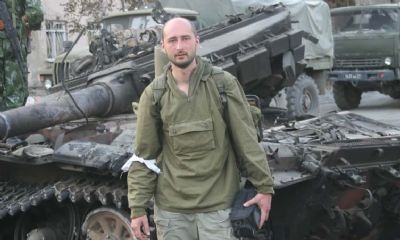A dissident Russian journalist has been shot at his apartment in Kiev in a high-profile murder that police said may have been tied to his reporting.
Arkady Babchenko, a veteran Russian war correspondent, was shot three times in the back as he left his apartment to buy bread. He was found bleeding by his wife. Babchenko, 41, died in the ambulance to the hospital, a government official said.
The killing appeared to be targeted. The gunman had apparently lain in wait for him outside his apartment. The head of Ukraine's police force said that two motives were being considered: his "professional work and civil position". Police on Wednesday evening had not named a suspect, but did post a sketch of a bearded man in a baseball hat.
Babchenko had grown highly critical of the Russian government in recent years. He criticised Vladimir Putin's annexation of Crimea and his support for the separatists of south-east Ukraine. He left Russia in February 2017, writing that it was "a country I no longer feel safe in".
The killing was the most recent murder of a high-profile dissident in Kiev, a city that has become a refuge for some of Moscow's most vehement critics, as well as the scene of targeted assassinations that have remained unsolved for years. In 2016, the investigative journalist Pavel Sheremet was killed in a car bombing outside his apartment. Some journalists have claimed that Ukraine's powerful intelligence agency has sought to stifle the investigation.
Babchenko's murder quickly attracted international attention. Harlem Désir, the media freedom representative at the Organisation for Security and Cooperation in Europe, said he was horrified by Babchenko's death. "I call on Ukraine authorities to conduct immediate & full investigation," he tweeted.
Ukrainian and Russian officials immediately traded finger-pointing over his death. Anton Gerashchenko, a Ukrainian lawmaker who serves as an adviser to the interior minister, said on Facebook that investigators would be looking at "Russian spy agencies' efforts to get rid of those who are trying to tell the truth about what is going on in Russia and Ukraine".
"Ukraine is becoming the most dangerous country for reporters," Russian lawmaker Yevgeny Revenko said in remarks carried by the state RIA Novosti news agency. "The Ukrainian government can't guarantee basic freedoms."
Babchenko served as a soldier in both wars in Chechnya before turning his bleak experience into the acclaimed memoir One Soldier's War. He served as a war correspondent for more than a decade, writing about the war in Georgia and later in southeast Ukraine. He fled Russia in 2017 after provoking a scandal in a Facebook post that expressed indifference over the deaths of a military choir and other passengers aboard a Russian plane that crashed en route to Syria. In the backlash, his home address was published and he received personal threats. Some people called for Babchenko to be stripped of his Russian citizenship.
He moved first to the Czech Republic and then to Israel, before settling in Kiev, where he worked for the Crimean broadcaster ATR. "All the elements of the propaganda machine were engaged," he wrote in the Guardian last year, calling the experience "so personal, so scary, that I was forced to flee".
A number of other critics of Russia have been killed in Kiev in recent years. An ethnic Chechen fighter named Amina Okuyeva was killed outside Kiev in a car bomb in October. In March 2017, renegade Russian lawmaker Denis Voronenkov was shot and killed at the entrance of a hotel in Kiev. Ukrainian prosecutors alleged that Voronenkov, who had toed the Kremlin line while serving as a Russian lawmaker but became a critic of the Kremlin after his 2016 move to Ukraine, was killed on orders from a Russian crime lord.
As a reporter, Babchenko staked out a position as an opponent of war. His memoirs were the opposite of triumphant, describing the dangerous, banal daily life of a soldier on the frontlines of the conflict in Chechnya. Asked what he wanted to say in the memoirs, he told the Guardian in 2007: "I exist. I was in this war. And this is what I saw."
The day of his death, he wrote online about an incident in which a Ukrainian general denied him permission to travel on a helicopter during the beginning of the war in 2014. The helicopter was later shot down. "Fourteen people were killed," Babchenko wrote. "I was lucky. It turns out to have been the second day of my birth."
May 29, 2018
Russian journalist and Kremlin critic Arkady Babchenko shot dead in Kiev
Date
May 29, 2018
Title
Russian journalist and Kremlin critic Arkady Babchenko shot dead in Kiev,
The Guardian
Author(s)
Andrew Roth
Original Source

